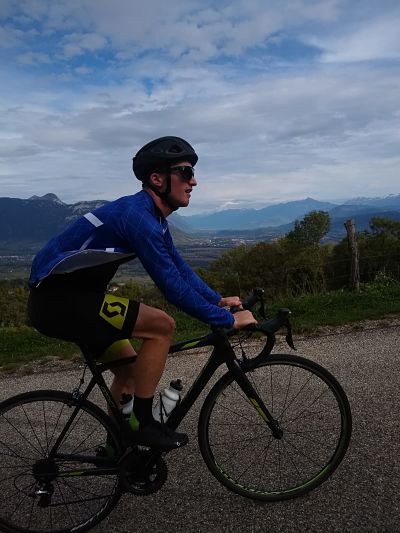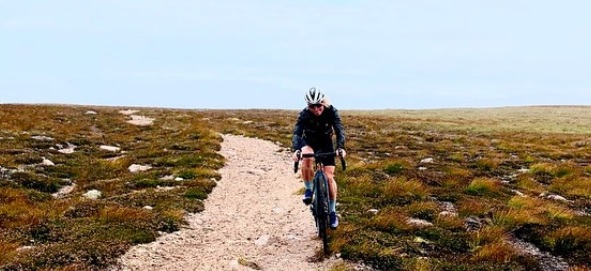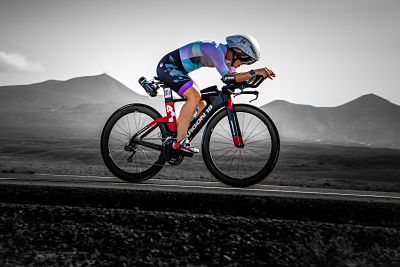Several triathletes using Precision Fuel & Hydration products made a welcome return to racing at the Helvellyn Triathlon in September and it turned out to be a brutal reintroduction to competitive action as the undulating course, biting wind and driving rain were a sharp reminder that the British summer is coming to a close.
We caught up with pro triathletes Ruth Astle - who finished 2nd in the women's division - Tara Grosvenor - who was two spots behind Ruth in 4th - and Fergus Roberts to find out how training during a pandemic had helped them prepare for the challenging course and the unusual proposition of taking part in their first race of the year in September...
The first question is an obvious one - after all of the months of indoor training and race postponements, what were you feeling going into this race?
» Ruth Astle, pro triathlete and fastest Age-Grouper at the 2019 IRONMAN World Championships:
I was so excited to actually be on a start line, although I didn’t want to get too excited until we were actually standing there and about to set off on the swim.
I was also very nervous - it's been so long since racing took place that I was sure I would forget something important and I just wasn’t sure how it would feel.
» Fergus Roberts, professional long distance triathlete:
It really has been a crazy year for everyone. I've been living in the Alps for the last 18 months and when the lockdown hit it was a strict nine weeks where no outdoor activity was permitted.
So, after nine weeks of Zwift and entertaining myself via alternative means, I was ready to get back outdoors.
By early May I saw no sign of things changing, especially when events were getting cancelled left, right and centre.

So, I made the decision to take a step back from intense training and just enjoy the sport in a more chilled out fashion. I took it as an opportunity to spend more time with my girlfriend, Sara, and explore the area that I was living in because I knew this opportunity may not come around again.
I've really enjoyed the change and it's been the first time I haven't had a summer involving competitive sport since I was about 11 years old.
However, 10 days before the race I heard Helvellyn Triathlon was going ahead. Being from Yorkshire, TriHard events were some of the first races that I competed in so it sounded like a cool opportunity to support a local event and race against some of the best guys in the sport.
It was a strange feeling going into a race with no proper training, but exciting all the same. In the week leading up to the race I swam more than I had done for the past six months, but thankfully when you've been swimming for most of your life, it's not too hard to get back into it.
I arrived back in the UK on the Friday before the race, so I had no expectations and went into the race thinking of it as a fun day in the mountains rather than a race.
» Tara Grosvenor, former ultra-marathon runner-turned-professional triathlete:
There was definitely a mix of emotions going into this race; excitement, apprehension, nerves.
It has been longer than the COVID hiatus since my last race due to injury and illness at the tail end of the 2019 season, so it's been just under a year since my last race.
Add in that fact that the Helvellyn Triathlon is not your ‘run of the mill’ race, it definitely made for "interesting" feelings in the lead-up.
And how did the last 6 months of training (and all of the Zwift riding) set you up for racing Helvellyn?
» Ruth: To be honest, I've spent a lot of the last six months just training and doing a few different things as opposed to specific race training. I only signed up to Helvellyn four weeks out when it became obvious the French IRONMAN races weren’t going to happen.
So I didn’t feel super-prepared for a race, but I did feel fairly fit.

What was the best and worst part of the course for you? We saw the water temp was showing as 13 degrees and there was the infamous ‘Struggle’ - which involves 400m of calf-burning climbing over 5km at Kirkstone Pass - as well as the demanding run terrain…
» Ruth: The best part of the course was probably the run, particularly the second half of the climb where I felt like I was getting into my rhythm a bit and knew I was catching some of the women.
I never really got going on the bike and my legs felt terrible, and the swim is never going to be my favourite part!
» Tara: Going into the race, I was most excited about the run (as this is my background of the three disciplines) and I have experience racing in the Lakes having raced two short distance Ultra Marathons in the fells in previous years (both of which included Helvellyn as one of the summits).
I was nervous for the swim due to the water temperature and more specifically about not being able to warm up and get going on the bike.
Prior to the race I was most apprehensive about the bike for several reasons; this has always been my weakest discipline and with it being a tough course (despite being shorter), I wanted to put in a respectable performance.
With the course being technical (and especially with open roads and while racing) there is always a risk of a crash and I sometimes get carried away on the downhills (!).

I hadn’t ridden ‘The Struggle’ prior to the race and was uncertain whether I had chosen the right gearing for the course… and you always build things up to be worse in your head than they actually are.
Interestingly, I ended up having a far better day on the bike than the run and didn’t get cold at all during the race, despite being on the top of a mountain in near freezing temperatures and persistent rain in just a tri suit (not recommended for a normal day out in the mountains!).
» Fergus: In "normal" years, I couldn't have had a course more suited to my strengths.
I love cold water swims, I'm a strong climber on the bike and do quite a lot of fell running so it is my preferred terrain.
On the flip side, when you're not fit, it's a course that you cannot hide from, so I was completely exposed.
Before the race, I had a hope that my experience and usual strengths might save me but it didn't end up playing out like that.
So, my worst parts of the race were being cold for the first 50 minutes of the bike, being on a road bike on the fast TT section of the course and my back going into spasm on the ascent of Helvellyn where I was reduced to walking the whole climb.
My best parts were surprising myself that I could still swim at decent level, any of the climbs on the bike - especially up 'The Struggle' and descending Helvellyn reasonably well.
At 950m, Helvellyn is the third-highest peak in England, so did you make any special kit changes to account for this challenging course?
» Ruth: I opted for TT bike as the majority of the bike is actually reasonably flat / downhill so you would lose a lot of time on the road bike.
I probably should have changed my gearing (55/42, 11/28 was not ideal for 'The Struggle'!), but I had recce’d the course the week before and knew I could make it up in my gears, and I hoped I could use my bigger gearing on the fast bit.
And I'm so glad I used trail shoes - anyone in road shoes would have been in for a bit of a shock, especially in the rain!
RACE RESULTS! #HelvellynTriathlon - Top 🔟
— T100 Triathlon World Tour (@t100triathlon) September 6, 2020
1. @AliBrownleetri (03:16:28)
2. @teamGoodwinTri (03:18:14)
3. Jack Willis (03:18:16)
4. @elliot_smales (03:21:43)
5. @NikkiBartlett1 (03:23:02)
6. Jack Hindle (03:32:42)
7. Lewis Byram (03:34:05)
8. @Rastle50 (03:34:36)
[Post 1/2] pic.twitter.com/rmiUaRbVov
» Fergus: I chose a road bike for this course, mainly because my TT bike was in pieces and I have spent zero time on it since pre-lockdown, so I thought a road bike was better for me on a technical, hilly course.
However, I think a TT bike was more beneficial. Other than the climbing sections, it was actually a very quick course and lots of opportunity to get the head down and go hard. I guess I know for next year now!
I went for my trusty Inov8 fell shoes - road shoes were not made for Helvellyn on a wet day.
» Tara: For the swim, I wore a very stylish neoprene cap (which I purchased a couple of days before the race in the Lakes in a panic) and I'm very glad of this last minute panic purchase.
I also wore a base layer, arm warmers and calf guards under my Snugg wetsuit in preparation for the bike. I was lovely and warm on the swim.
I rode my new Argon 18 E118 Tri+ TT bike and my new Parcours deep section wheels.
I haven’t yet been fit on the new bike and I am still getting used to the handling, so I'm pretty sure this contributed to my lower back pain on the run and a slightly more tentative descent down the pass due to the different bike geometry, offset with the new bike having disc brakes which were excellent on this course and in the wet.
The piece of kit I debated most about was the jacket for the bike as I didn’t want to overheat but also didn’t want to be cold; I ended opting for a Rapha winter gilet which has a insulated front panel. It is also light in colour so helps with visibility with low light and open roads.
For the run, I used some low profile Inov8 trail shoes. I chose a smaller ‘lugged’ shoe as I knew the course would be rocky and therefore a high profile large lug would have been less grippy in the wet and on rocks.
I know all athletes were made to carry a pack for the run with some mandatory kit, this is commonplace in trail and ultra events but pretty unique in triathlon, how did you find that?
» Tara: Due to my background of mountain running and trail running, I am used to carrying kit when running.
I've done some night mountain runs in the Brecon Beacons in the middle of winter where it was mandatory to carry 2 litres of water, full warm kit and a mug of hot drink (and the list goes on…).
So, the kit list for this run was minimal (but safe) in comparison.
It was a slightly odd sensation picking up my run vest in transition though. Equally as weird as putting a gilet on in T1. In fact, it was so weird that I forgot it and had to go back (as it had my nutrition in - rookie error!).
» Ruth: I had a great little backpack that I actually didn’t notice at all when running. It was nice in some ways to have water with me, and knowing that you are self-sufficient.
» Fergus: Yep the mandatory kit included a rear light on the bike and a run pack with certain items including warm clothing and a survival blanket. It was purely for safety reasons and rightly so, the conditions on the bike were pretty grim and on open roads so the rear light was a priority, especially on the A66.
I have used a running pack on numerous occasions and it was useful for carrying food. Hydration on the bike was important as I didn't want to carry water on my back for the run - I used two 500ml bottles with the PH 1500 electrolyte tabs. Then a few handfuls of stream water on Helvellyn was enough to see me through.
